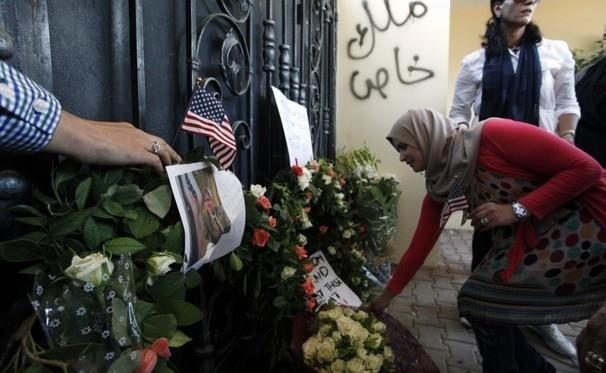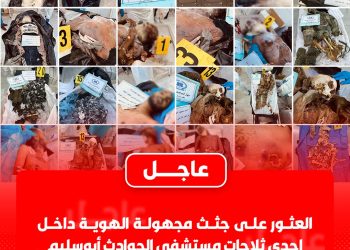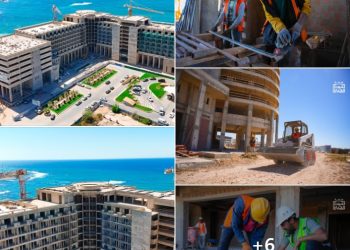By Nihal Zaroug.
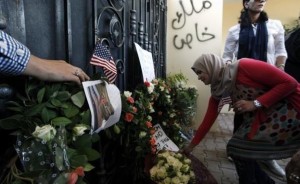
Tripoli, 20 September:
A week has passed since the violent attack on the US consulate in Benghazi left four dead, . . .[restrict]including Libya’s esteemed US ambassador Chris Stevens. The Libyan government has made some arrests and has issued an order to disband their main suspects, Ansar al Sharia, a militant extremist group.
Furthermore, President of the General National Congress, Mohamed Al Magariaf, said that foreign elements that have been in the country for sometime, helped plan the attacks. Adding that investigations into the events would likely turn up a connection to Al Qaeda.
The US government on the other hand, is still claiming that the unfortunate events on 11 September were a spontaneous reaction to an anti-Islam film and will hold this view until they have fully investigated what has happened.
US ambassador to the United Nations, Susan Rice, recently said that evidence they gathered thus far indicated that protests over the film had “been hijacked by some clusters of extremist who came with heavier weapons”. Rice did not link these extremists to Al Qaeda, as the FBI had not completed its investigations, she stated.
On Tuesday, in memory of Stevens, Benghazi residents gathered at the US consulate to lay flowers and light candles, and left signs at the gate expressing their rejection of the attacks, extremists and terrorism.
While both governments look for answers, the vast majority of Libya continues to condemn the violent assaults and have planned to hold rallies on Friday, 21 September, calling for the government to take action over Libya’s lawlessness.
The initiative “Save Benghazi” was the first call for a city wide rally, other cities soon followed suit. The four unified demands displayed on posters are as follows:
“Withdrawal of all authorities granted to any armed militia; Calling on GNC to issue law criminalizing armed militias; Evacuation of all public buildings and governmental institutions from armed militias; Activation the role of the army and police, and provide them with all the support needed.”
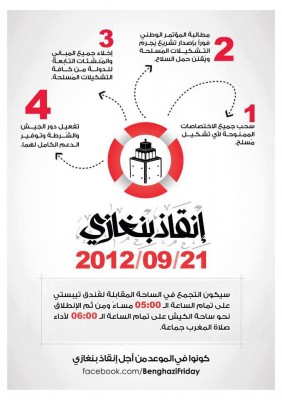
(via http://www.facebook.com/BenghaziFriday )
The march starting at the Tibesti hotel in Benghazi, aims to clarify that residentss of the city are against terrorism, armed militias and the killing of innocent lives. Fringe groups, they say, have jeopardized the revolution, and their actions will no longer be tolerated.
Benghazi is seen as the cradle of the uprising that ousted Qaddafi’s regime, and the organisers call on the public to protect what has been fought for during the revolution.
Bilal Bentamer, a senior law student and volunteer for Save Benghazi, says the idea for the rally took-off from earlier protests against the attacks and the response from the city has been positive. Donations started to come in without even being requested, collecting well over three thousand dinars and counting.
The rally being well received comes as no surprise, this is not the first time the city has made such appeals. Benghazi has been trying to distance itself from the actions of extremists but as suggested by many, including Bilal, “the world needs to know that Benghazi is still against the film and insulting the Prophet, yet we don’t accept killing friends like Chris Stevens, and that extremists in Benghazi and Libya are not the majority.”
According to many activists, militant islamist in Benghazi are its biggest problem and after dialogue fails, removal by force may be required and this is the role of government, they say.
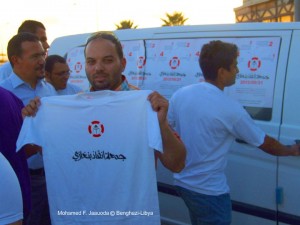
(photo: Mohamed F. Jaauoda)
In Tripoli, activist Khadija Ali was among the first to call for protests in the wake of the US consulate attacks, and is currently working with a group of activists organising “Save Tripoli”. The march will celebrate the occasion of International Peace Day and show solidarity with “Save Benghazi”. The event seeks to promote the view that Libya is a peaceful nation and that Libyans “aspire to live in safety and stability”.
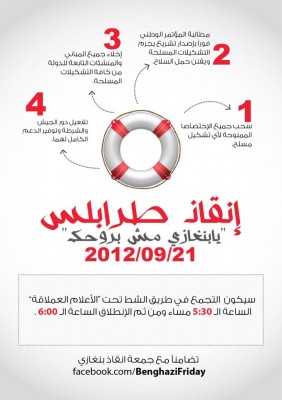
(via http://www.facebook.com/BenghaziFriday
But more so, Khadaji would like people in Libya to feel the “unity they once felt during the liberation stage of the revolution and a sense of belonging not only to Libya but also to a greater international community “ and to become actors in world peace.
The greatest challenges facing Libya that of “security, law and order” says Khadija, needs the publics’ engagement of the government to ensure that citizens’ expectations are met. After the destruction of heritage sites in August, “a wake up call to civil society”, according to Khagija, it became clear to activists and those wanting change that “if they don’t act then no one will act on their behalf.”
Tripoli’s peace and solidarity march will take off from the coastal road park, and attendees are urged to wear white; the colour of peace.
Posters for “Save Derna”, “Save Zawiya” and “Save Gheryan” have appeared on Facebook, however the largest crowds are expected to assemble in Benghazi and Tripoli. Derna, especially would like to banish the view that it is the hot bed for extremists groups such as Al Qaeda in Libya.
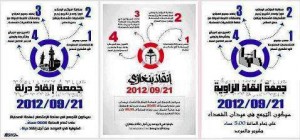
(via http://www.facebook.com/BenghaziFriday)
For more information see Save Benghazi and International Day of Peace in Libya .
[/restrict]


